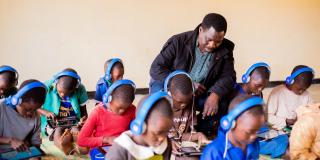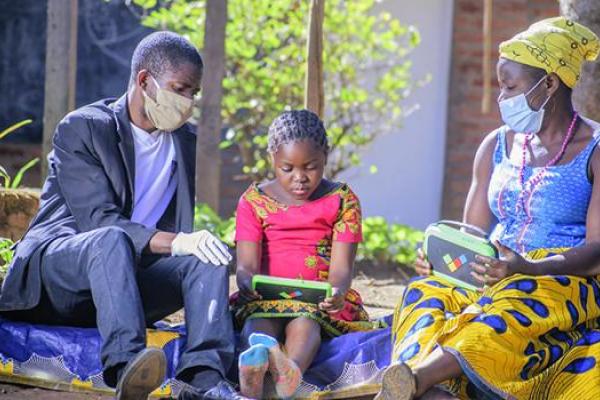
September 2023 to 2028
The education system in Malawi faces significant challenges including: overcrowding in classrooms, lack of learning materials, shortage of trained teachers, and high student-to-teacher ratios. As a result, only 10% of children achieve reading proficiency by the age of 10.
In order to build a strong structure, you must start with a sound foundation.Hon. Monica Chang’anamunoMP Deputy Minister of Education
Through the Building Educational Foundations through Innovation and Technology (BEFIT) project, we’re aiming to improve the foundational literacy and numeracy skills of all learners at levels 1-4.
BEFIT is massively scalable, evidence-based, and will serve 3.5 million children across 5,770 public primary schools. This model has already been successfully implemented in over 250 schools across Malawi since 2014, serving 225,000 children via the Unlocking Talent program.
Transforming education through technology

Child-directed, adaptive learning is delivered to the student on a tablet. The model overcomes systemic barriers and is highly scalable because of:
- Access - Tablets work without internet or grid power. Learning is at the right level for each child.
- Efficacy - onebillion’s software provides a complete, evidence-based curriculum/pedagogy and has consistently shown strong learning gains.
- Affordability - Attractive unit-level costs of $6-$8 USD per child/year that continue to decline with economies of scale.
Building on our evidence
Multiple studies in Malawi have shown positive and meaningful results in literacy and numeracy learning. Children’s excitement about school, attendance, and confidence as learners also improved as a result.
Recent results from Imagine show that after having schooling disrupted for 13 months due to COVID-19, four months of additional literacy learning meant:
- 72% of children showed emergent or fluent mathematics status
- 50% more children advanced on national literacy benchmarks
- Girls benefited just as much as boys in contrast to standard classroom practice.
Malawi will be one of the first developing nations to scale a digital personalized learning solution countrywide. The program will serve millions of children in Malawi and create a road-map for other countries to follow.
Creating sustainable change
Government owned

The program will be owned by the Ministry of Education’s Directorate of Basic Education (DBE) and will utilize existing government resources, be aligned to the national curriculum, and be embedded within school timetables.
The software is in the local language of Chichewa and will supplement existing teacher-led instruction. Each durable tablet will be used by an average of five students for an hour each per day.
Strengthening local systems
A hybrid digital/in-person training model will ensure that educators in every district and school level are successfully trained on the intervention.
Using sustainable infrastructure, such as solar charging systems, means digital products have an extended lifespan. The project will utilise local capacity for maintenance, benefitting children, communities, and the Malawian education system for decades to come.
Attractive unit-level and ongoing costs
The proposed implementation model costs $6-$8 USD per child per year to provide a program proven to improve educational outcomes significantly. Costs are expected to decline over time as lessons are learned and economies of scale are realized.
BEFIT is run by the Malawi government and supported by a consortium of partners including VSO, Imagine Worldwide, onebillion and other local implementing organisations.
